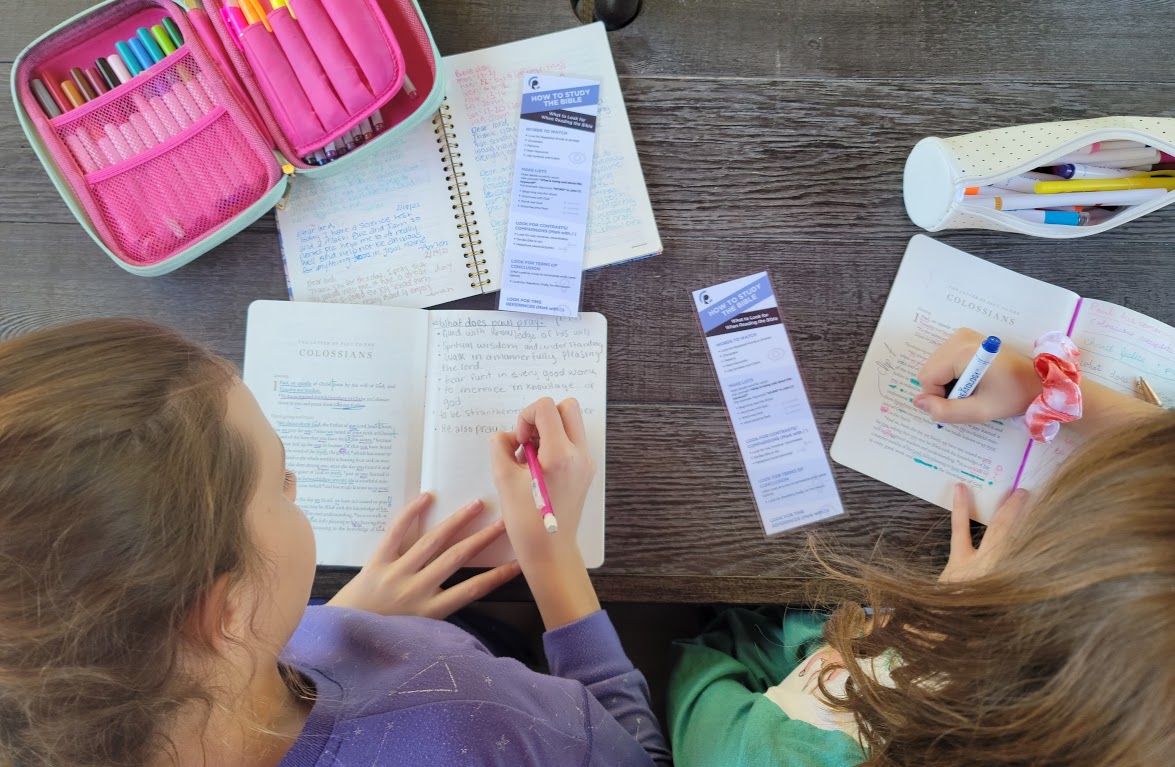“Hey, Mom, when will we meet to discuss our Colossians study again?”
The intensity of our schedules had recently experienced an uptick in activity.
Kids sports, homework, and out-of-town company made our family’s weekly devotional time an exception rather than the rule.
However, when my 17-year-old son asked me this question, I rejoiced that he had noticed and wanted us to pick it back up.
Is there anything better than seeing your kids enjoy studying the Word of God?
Learning by Doing
I struggled for too many years to enjoy Bible study.
I lacked the confidence to dig in and do it on my own.
I relied on purchasing a book, Bible study at church, or listening to online sermons.
So, when I learned the Inductive Bible Study Method, I was able to enjoy my quiet time for the first time in…forever.
I decided to teach this method to my kids.
If I could shave off 30 years of struggle for them to enjoy study (like it took me), isn’t that reason enough?
I love a good system, and where I once didn’t have one, the Inductive Bible Study Method filled in the gaps.
Even though it’s challenging to get everyone together in this season of our lives, we set out to redeem one night a week to study the Word together.
I hope by the end of this post, you’ll also feel encouraged and equipped to implement a study of the Bible with your family.

I hope by the end of this post, you’ll also feel encouraged and equipped to implement a Bible study time with your family.
What is the Inductive Study Approach?
Simply put, the Inductive Study consists of three main parts.
- Observation: What does the text say?
- Interpretation: What does it mean, by what it says?
- Application: How does this apply to me?
You may approach learning most things this way already.
If you want to bake a cake, first read the recipe and make sure you have all the necessary supplies (observation). Then, you follow the recipe and bake your cake (interpretation). When you’re finished baking, you eat it and decide how to improve it next time (application).
We naturally do this as we break down the steps to accomplish a project, learn a new skill, or read something new.
I’m getting nerdy about this, but consider how the Inductive method also aligns with the progression of a classical learning pedagogy.
In classical education, we progress through grammar, logic, and rhetoric.
In biblical terms, we call it knowledge, wisdom, and understanding
My son, if you accept my words and store up my commands within you, turning your ear to wisdom and applying your heart to understanding—indeed, if you call out for insight and cry aloud for understanding, and if you look for it as for silver and search for it as for hidden treasure, then you will understand the fear of the LORD and find the knowledge of God. For the LORD gives wisdom; from his mouth come knowledge and understanding. Proverbs 2:1-6
The difference between applying this approach to studying the Bible and learning any other skill is the promise of blessing that comes from using our hearts to understand God’s word.
It’s like digging for hidden treasure and finding it!
I’ll take that return on investment every day!
How do you study the Bible with your family?
Remember that we naturally observe, interpret, and apply information all the time, often simultaneously. These aren’t hard and fast rules that always neatly follow a precise order.
But there are certain things to look for and do to get the most out of your Bible study. You’ll feel more confident to lead a Bible study with your kids when you know what to look for.
Before starting, begin in prayer, asking God for his help to add wisdom and understanding to your knowledge.

STEP 1: OBSERVATION (What does it say?)
This is the 15,000-foot overview of your study.
You want to understand the flow of the text, setting, characters, theme, keywords, and themes.
- Read and re-read the book to be studied several times before you mark anything
- Identify the type of literature you’re reading (history, poetry, wisdom, prophecy, epistles, or apocalyptic)
- As you continue reading, try to answer the 5 W’s and 1 H questions (who, what, when, where, why, and how?)
- To learn context, begin by identifying the facts about people and events mentioned
- Read and re-read until you discover keywords and phrases that are repeated
- Make a list of those keywords and phrases, and assign a symbol or marking for them
- Write down a summary of the main theme of the book, chapter, or passage
- Read chapter headings to help you find sub-themes within the main theme

STEP 2: INTERPRETATION (What does it mean by what it says?)
We’re dropping our altitude to about 5,000 feet now.
Now you’re reading for understanding.
- Review big picture context clues you’ve already found
- Mark keywords and key phrases in your journal
- Make lists from the Keywords (i.e., What things does Paul pray for the Colossians in chapter 1?)
- God reveals truths in many ways. Reread the text and look for the following:
- Contrasts
- Comparisons (look for words like: but nevertheless)
- Terms of conclusion (look for words like: therefore, finally, for this reason)
- Expressions of time
- What was the chapter’s theme? Write a statement.
- What was the paragraph theme? Write a statement.

APPLICATION (How does this apply to me?)
We’ve landed the plane, and now we’re at street level.
Now, we personalize and internalize what we’ve read.
Ask…
- “How does the meaning of this passage apply to me?”
- “What truths do I need to embrace, believe, live by?”
- “What changes should I make in my belief and life?”
Kay Arthur explains, “The Inductive Study doesn’t tell you what the Bible means or what you should believe. Instead, it teaches you a method of studying God’s Word that can be applied to any portion of scripture at any time for the rest of your life.”
Did you get that last part?
When you learn this method, you can apply it to any portion of Scripture, at any time, for the rest of your life.
The goal isn’t to store up more head knowledge but to be transformed by it.
How to Implement Bible Study with Your Kids
Here’s your opportunity to go from observation to interpretation and application.
I’ve created a free 7-Day Colossians Inductive Bible Study for you to do either for yourself or with your kids.
It’s designed to walk you through the actual process of an Inductive Study with your family.
You’ll observe, interpret, and apply for yourself as you discover how Inductive study works and how it will equip you for future study and discovery.
Plus…Colossians is a glorious letter of the supremacy of Jesus as the center of all reality. (A wonderful truth to instill into any heart, at any age!)
Together, you’ll dig for diamonds and find them.
This is family time at its finest!
Cara
P.S. If you’ve found this tool helpful, I’d love to feature your review on my site. Just email me at [email protected] to share your thoughts, comments, and suggestions.
*This post includes affiliate links. If you click and make a purchase based on my recommendation, I earn a small commission, at no extra cost to you. I only recommend things I actually use and believe to be a blessing!

4 Responses
I love inductive study! And I love that you’ve made it accessible for your kids to do with you as well. The step-by-step guide and the questions you’ve provided here will be a help to many! Grateful for your work on this post!
Thanks again Lauren! Isn’t inductive study the best? Thanks for your encouragement!
Thanks for sharing Cara! I love Inductive Study! I was introduced to it at H-town nearly 20 years ago. I’ve been through many of Kay’s precept classes, but I feel so empowered to know I am fully equipped to sit and tackle God’s word without a guided bible study. I am teaching the method to my American Heritage Girls troop and they are loving it! How to Study the Bible for Kids is an excellent resource for families too
Hi Jessica! Thanks for your comment. I love hearing how Inductive study has helped you and you’re spreading it to your circles of influence. That’s awesome! Won’t it be great for these young people to know at such an early age how to study the Word for themselves?! What great things they’ll do! <3